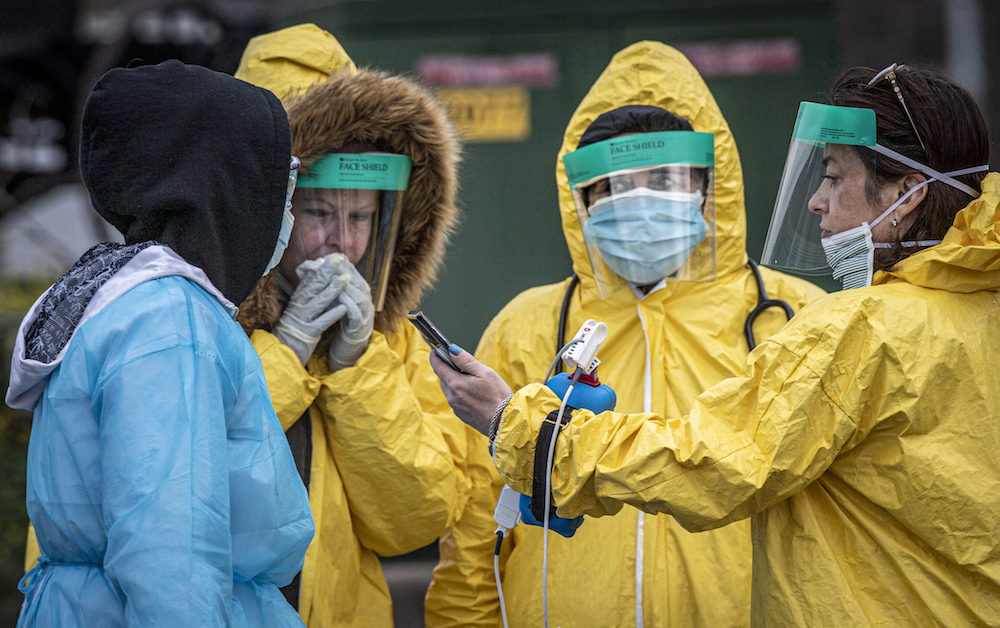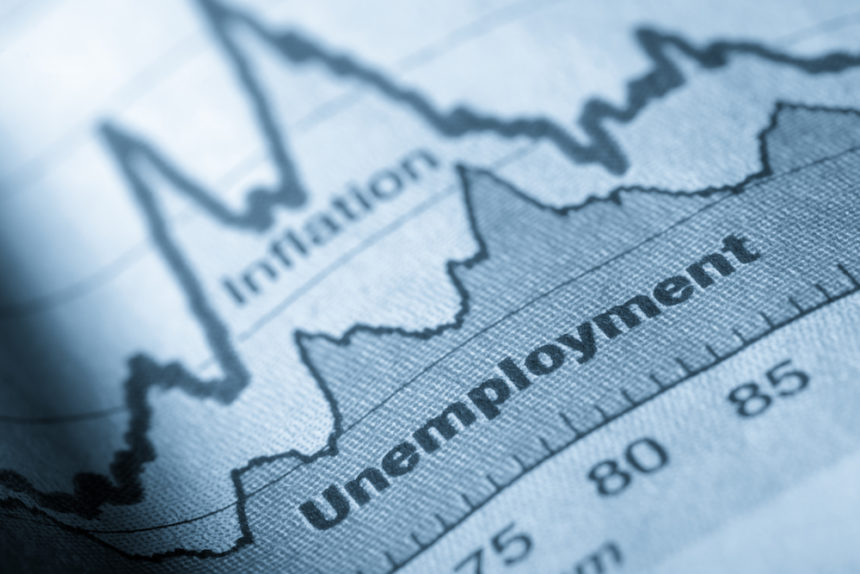Every day seems to alternately feel like an entire lifetime, and drip slowly by, like a pour over crafted by an artisanal barista. There’s so much happening, so fast, and so much of it surrounded by conflicting information, that it can be difficult to figure out who and what to listen to. We hope these daily missives aggregating the best content from across Haymarket Media and elsewhere are helping parse the noise.
Today’s Coronavirus Briefing is 1,360 words and will take you six minutes to read. Register for the newsletter here.
The top line
- Figures released this morning show that unemployment claims last week surged to a record 3.28 million, far exceeding the previous highest week in 1982 when 695,000 registered. Workers in the restaurant, bar, hotel, airline, cruise line, auto and entertainment sectors were hardest hit.
- Sponsors and broadcasters of the Tokyo 2020 Olympic Games praised the International Olympic Committee and Japan’s Prime Minister Shinzo Abe for postponing the Games. Campaign Asia-Pacific quoted Alibaba Group, which called the move “the epitome of the Olympic spirit of peace, friendship and solidarity.”
- Yesterday Italy’s death toll passed the 7,500 mark. However, new cases of contagion fell for the fourth day in a row.
- COVID-19 seems to disproportionately affect men but there is still not enough data to understand why. And young people are by no means immune to the virus.
- The U.S. Senate unanimously passed a $2 trillion stimulus plan. The House is expected to pass the bill tomorrow, and immediately send it to President Trump for his signature.
- And some encouraging news from a number of scientists: the coronavirus is not significantly mutating as it circulates through the human population. This suggests that a single vaccine administered yearly, like those for the flu, will offer protection in the future.
Takeaway
In areas where the full impact of COVID-19 is only now becoming clear, hospitals are reaching capacity and health workers are under tremendous stress. But, amidst the darkness, glimmers of light are breaking through.

Good brand; bad brand
Many brands are adjusting their messaging, marketing, and production to create campaigns to help fight the virus. Many are not. Here’s a look at some of each.
- British activewear giant Sports Direct has come under fire for staying open and asking staff to work as normal, despite government guidance for all but essential businesses to close. In response to blowback, Chris Wootton, the company’s chief financial officer, argued: “We are uniquely well placed to help keep the U.K. as fit and healthy as possible during this crisis.” Siobhan Palmer for People Management reports.
- Michael Heusner reported in Campaign US that cold and flu brand Mucinex, in collaboration with McCann NY and McCann Health NY, has pivoted from fighting symptoms, to fake news, in its “Spread Facts, Not Fear” campaign. The campaign encompasses social media, print and out-of-home activations.
- Arvind Hickman of PRWeek UK wrote about billionaire Australian retailer Gerry Harvey, who explained to the country’s 60 Minutes show on Channel 9 that coronavirus was “pretty much nothing to get scared of.”
- In MM&M, Alison Kanski examined how brands can maintain relevance during the COVID-19 outbreak. Those doing the best job are acting on the promises in their communications, engaging in conversations with stakeholders, and expanding spokespeople beyond just the CEO.
- South by Southwest (SXSW) does not have insurance to cover its cancellation and, as such, is not issuing refunds. In a statement, the film, music and interactive festival’s organizers said: “Any and all payments made to SXSW are not refundable for any reason, including without limitation, failure to use credentials due to illness, acts of God, travel-related problems, acts of terrorism, loss of employment and/or duplicate purchases.”
Takeaway
In a perfect world, every brand, business, corporation and human being would live by ethical and compassionate core values. Sadly, we do not live in a perfect world. There’s hope though, that those putting their money where their mouths are and embracing collaboration will come out on top when all this is over – and consumers will remember brands that did the right thing.

Frontline workers, patients and innovations
While the news isn’t good in terms of what we’re dealing with, it’s uplifting regarding who we’re dealing with. Healthcare workers, administrators and their staff across the country are doing their best to care for patients, residents and for themselves.
- In McKnight’s Senior Living, Lois Bowers explains that, while many sectors are suffering under the current crisis, none are more directly affected than the senior living industry. Workforce, supplies, occupancy and operations have all been profoundly affected.
- Lisa Berger wrote in McKnight’s Long-Term Care News about long-term healthcare administrator John Cofrancesco, who lost his life to COVID-19. “Unfortunately, we are all beginning to adjust to the concept that Cofrancesco’s death may not be the last from this close-knit professional community,” said Berger. “As of Monday, 147 nursing homes across 27 states have at least one resident with COVID-19, according to data from the Centers for Disease Control and Prevention.”
- Jody Charnow made the case for early testing in his report on an unusual COVID-19 patient for Renal & Urology News. In what is thought to be one of the first cases of COVID-19 in a hemodialysis patient in the U.S., a 56-year-old man with end-stage kidney disease was initially diagnosed with food poisoning.
- In GP online, Nick Bostock talked to a former British Army medical officer who put out a call on Facebook for help figuring out how to keep people protected, without depleting hospital stock. Within 24 hours, specialist cycling companies Aerocoach and 3T, along with staff from Henry Hoover company, banded together to create 3-D printed protective face visors.
Takeaway
Once again, there’s a message of hope in the collaborative ways people are coming together to fight the effects of the pandemic. We are going to need much, much more.

The sound of silence
Is there a more nostalgic image than this muted, pre-dawn photograph from Woodstock? It virtually compels the viewer to quit their day job, slip on their finest poncho, and flock to the closest music festival. But this summer is looking like a quiet one. The music industry is reeling with cancellations — from major acts, to massive festivals — turning one of summer’s greatest rituals into an eerily quiet soundscape.
- In Campaign UK, Yasmin Arrigo spoke to experience creators and culture makers finding alternative ways to support artists and their audiences desperate for connection.
- Mark Williams in Conference & Incentive Travel has a list (with live updates) of the latest international event postponements and cancellations.
- For some positive news, in Third Sector, Rebecca Cooney reports that arts charities in England will have the opportunity to apply for emergency funding as part of a COVID-19 support package launched by Arts Council England.
- And back to some not-so-positive news: analysts are predicting the music industry may lose $5 billion in revenue from festival cancellations. The more artists cancelling tours, the further the losses get pushed into next year as competition for available venue dates escalate and end up cannibalizing opportunities for artists in 2021.
- And here’s this generous list from Billboard of all the live streams and virtual concerts you can watch. It’s constantly being updated.
Takeaway
While touring is key for artists, both in terms of exposure and making a living, everyone is quickly adapting and finding other ways of reaching their audiences. It may not bring in the same levels of revenue, but like the song says, rock-n-roll can never die.
And speaking of rock-n-roll…
Lip syncing, harvest mice, more lip syncing
As usual, we leave you with a few, totally irrelevant choice pieces of content, for no other reason but to spread joy.
Don’t quote me, but I think this was the first Coronavirus Briefing that included some good news in and amongst the harsh realities of the pandemic. Stay strong out there and send supportive thoughts to all those healthcare and other workers battling the effects of this virus on the frontlines.








